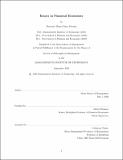Essays in financial economics
Author(s)
Martins, Fernando Miguel Pinto.
Download1227097628-MIT.pdf (3.608Mb)
Other Contributors
Sloan School of Management.
Advisor
David Thesmar.
Terms of use
Metadata
Show full item recordAbstract
This dissertation studies various facets of corporate governance across three chapters. Chapter 1 examines the relationship between corporate social responsibility (CSR), shareholder value, and competition by applying a regression discontinuity design to the outcome of CSR shareholder proposals. The approval of CSR proposals generates positive abnormal returns on the vote date, increases CSR scores, increases market shares, and increases the CSR scores of industry peers. The impact on abnormal returns is higher among firms who possess low CSR scores, firms who operate in more competitive industries, and firms subject to higher customer awareness. Altogether, these results suggest that CSR improves shareholder value by enhancing the competitiveness of firms. Chapter 2 studies the underlying characteristics of shareholder activism and the stock market reaction to the announcement of activist campaigns. I find that hedge funds are the most common type of activists and that most campaigns are non-hostile. Stock markets react strongly to the announcement of activism as cumulative abnormal returns are close to 9% for value campaigns and 4% for ESG campaigns. These gains do not revert over the following year. Furthermore, industry peers under a high threat of activism also exhibit positive cumulative abnormal returns around the announcement of non-hostile ESG campaigns. These findings suggest that shareholder activism increases the shareholder value of target firms and generates positive spillovers when activists pursue ESG demands using non-hostile tactics. Chapter 3 examines the relationship between classified boards and managerial entrenchment by applying a panel regression discontinuity design to shareholder proposals on board declassification. The analysis focuses on shareholder proposals that pass or fail by a small margin of votes in order to provide a causal estimate of the impact of board declassification. I find that shareholder proposal approval leads to a reduction in CEO compensation, an increase in the likelihood of CEO replacement, a positive but insignificant impact on pay-performance elasticity, and an increase in firm value. The reduction in CEO compensation is strongest among firms who possess weaker levels of governance. These findings suggest that classified boards promote managerial entrenchment.
Description
Thesis: Ph. D., Massachusetts Institute of Technology, Sloan School of Management, September, 2020 Cataloged from student-submitted PDF version of thesis. Includes bibliographical references.
Date issued
2020Department
Sloan School of ManagementPublisher
Massachusetts Institute of Technology
Keywords
Sloan School of Management.